

Ray Kurzweil Predicts the Exact Year Singularity Will Occur. Ray Kurzweil Predicts the Exact Year Singularity Will Occur. When artificial intelligence meets human stupidity. From the US Government's Brain Research through Advancing Innovative Neurotechnology initative (BRAIN) to Google’s deep-learning artificial intelligence (AI) project, Brain; from Facebook hiring neuroscientists to work on a brain-computer interface to Elon Musk’s Neuralink, a company that aims to download your mind; or Bryan Johnson’s Kernel, a company that wants to merge the human brain with AI - the race to develop advanced AI is accelerating more rapidly by the day.
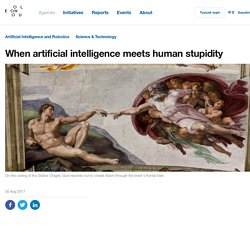
The Fourth Industrial Revolution: what it means and how to respond. We stand on the brink of a technological revolution that will fundamentally alter the way we live, work, and relate to one another.

In its scale, scope, and complexity, the transformation will be unlike anything humankind has experienced before. We do not yet know just how it will unfold, but one thing is clear: the response to it must be integrated and comprehensive, involving all stakeholders of the global polity, from the public and private sectors to academia and civil society. The First Industrial Revolution used water and steam power to mechanize production. Untitled. The Dawn of the Singularity: A Visual Timeline of Ray Kurzweil's Predictions. The Law of Accelerating Returns. An analysis of the history of technology shows that technological change is exponential, contrary to the common-sense “intuitive linear” view.

So we won’t experience 100 years of progress in the 21st century — it will be more like 20,000 years of progress (at today’s rate). The “returns,” such as chip speed and cost-effectiveness, also increase exponentially. The Unique Challenges of Exponential Leadership. Salim Ismail The term “exponential” refers to a sequence or process by which desirable results are achieved.
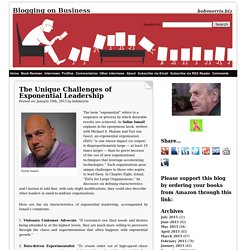
As Salim Ismail explains in his eponymous book, written with Michael S. Malone and Yuri van Geest, an exponential organization (ExO) “is one whose impact (or output) is disproportionately large — at least 10 times larger — than its peers because of the use of new organizational techniques that leverage accelerating technologies.” 8 Reasons Why We're About to See an Explosion in Robot Intelligence.
We are approaching a transformative expansion in robotics.
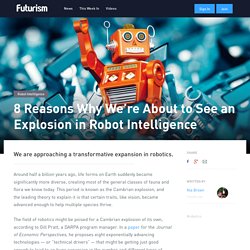
Around half a billion years ago, life forms on Earth suddenly became significantly more diverse, creating most of the general classes of fauna and flora we know today. This period is known as the Cambrian explosion, and the leading theory to explain it is that certain traits, like vision, became advanced enough to help multiple species thrive. The field of robotics might be poised for a Cambrian explosion of its own, according to Gill Pratt, a DARPA program manager. In a paper for the Journal of Economic Perspectives, he proposes eight exponentially advancing technologies — or “technical drivers” — that might be getting just good enough to lead to an huge expansion in the number and different types of robots. 1) Computing Performance.
Accelerating change. A perceived increase in the rate of technological change throughout history In futures studies and the history of technology, accelerating change is a perceived increase in the rate of technological change throughout history, which may suggest faster and more profound change in the future and may or may not be accompanied by equally profound social and cultural change.

Early observations[edit] Three Major Schools. (Originally appeared on the Machine Intelligence Research Institute blog, September 2007.)
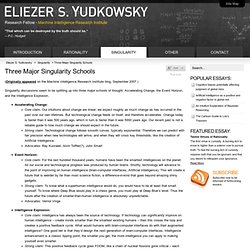
What is the singularity? Picture yourself trying to explain the experience of streaming a movie to William Shakespeare.
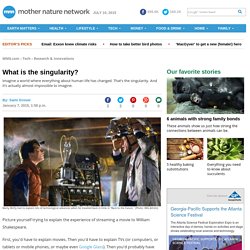
First, you'd have to explain movies. Then you'd have to explain TVs (or computers, or tablets or mobile phones, or maybe even Google Glass). Then you'd probably have to explain the Internet. And electricity. Maybe credit/debit cards and the modern banking system too. That, in essence, is at least one definition of a singularity: a moment in time where our technological and cultural realities have changed so drastically that our way of life would be incomprehensible to those who lived before that shift.
Evolution of evolvability. Evolution of Evolvability This paper shows how evolution tunes the content and frequency of genetic variation to enhance its evolvability.
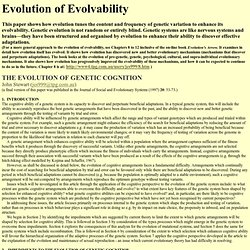
Genetic evolution is not random or entirely blind. Genetic systems are like nervous systems and brains—they have been structured and organised by evolution to enhance their ability to discover effective adaptations. The Futurist: Are You Acceleration Aware? The single most necessary component of any attempt to make predictions about the future is a deep internalized understanding of the accelerating, exponential rate of change.
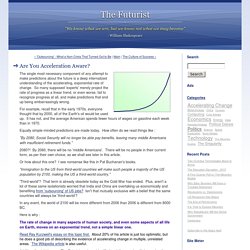
So many supposed 'experts' merely project the rate of progress as a linear trend, or even worse, fail to recognize progress at all, and make predictions that end up being embarrassingly wrong. For example, recall that in the early 1970s, everyone thought that by 2000, all of the Earth's oil would be used up. It has not, and the average American spends fewer hours of wages on gasoline each week than in 1970. Equally simple-minded predictions are made today. How often do we read things like : "By 2080, Social Security will no longer be able pay benefits, leaving many middle Americans with insufficient retirement funds. " 2080?! The Dawn of the Singularity: A Visual Timeline of Ray Kurzweil's Predictions. Ray Kurzweil’s Mind-Boggling Predictions for the Next 25 Years. In my new book BOLD, one of the interviews that I’m most excited about is with my good friend Ray Kurzweil. Bill Gates calls Ray, “the best person I know at predicting the future of artificial intelligence.”
Ray is also amazing at predicting a lot more beyond just AI. The World in 2025: 8 Predictions for the Next 10 Years - Singularity HUB. In 2025, in accordance with Moore’s Law, we’ll see an acceleration in the rate of change as we move closer to a world of true abundance. Here are eight areas where we’ll see extraordinary transformation in the next decade: 1. A $1,000 Human Brain In 2025, $1,000 should buy you a computer able to calculate at 10^16 cycles per second (10,000 trillion cycles per second), the equivalent processing speed of the human brain. 2.
The Internet of Everything describes the networked connections between devices, people, processes and data. 3. Future Timeline Latest Updates. Future Timeline. Ten Years To the Singularity If We Really, Really Try … and other Essays on AGI and its Implications. Can We Control Our Technological Destiny—Or Are We Just Along For the Ride? - Singularity HUB. “Man becomes, as it were, the sex organs of the machine world…”– Marshall McLuhan A standard assumption of technological progress is that new innovations are born in our mind, and we humans choose which of those visions to bring into existence. We imagine stuff, we want stuff, we build stuff, and repeat. Ray Kurzweil Speaking at Geek Park Innovation Conference, Beijing, China - Futurism. Ray Kurzweil Speaking at Geek Park Innovation Conference, Beijing, China Share This Tweet This Join .wp-social-login-connect-with{}.wp-social-login-provider-list{}.wp-social-login-provider-list a{}.wp-social-login-provider-list img{}.wsl_connect_with_provider{} Connect with:
Salim Ismail on Singularity University [Transcript] Endeavor is pleased to make public the following transcript from a presentation at the 2011 Endeavor Entrepreneur Summit in San Francisco. The event, which assembled over 450 entrepreneurs and global business leaders, featured dozens of entrepreneurship-related presentations by top CEOs and industry experts. Overview: Salim Ismail, successful angel investor and entrepreneur, former vice president of Yahoo! And current executive director of Singularity University discusses what Singularity University is and does and how technology will radically change the future. Bio: Salim is a successful angel investor and entrepreneur – his last company, Angstro, was acquired by Google in August 2010. He has operated seven early-stage companies and is a frequent speaker on internet technologies, private equity and entrepreneurship.
The Third Replicator - The New York Times. Leading climate change economist assesses chances of a singularity, concludes it is "not near" In Brief A new research paper by Yale economist William Nordhaus takes a sober but serious look at the Singularity hypothesis. What It Is Many economists believe in a theory called stagnation, which posits that economic growth will slow because of resource depletion and declining productivity. The Acceleration of Acceleration: How The Future Is Arriving Far Faster Than Expected. The future of technology will "pale" the previous 20 years. Linear & Exponential Change. Accelerating Future » Top 10 Transhumanist Technologies. Future Timeline.
The Knowledge Doubling Curve. Accelerating change. Infinity Point Will Arrive by 2035 Latest. Eray Ozkural December 23, 2013. The Exponential Growth of Computing. The Exponential Growth of Computing in this Century. The best visuals to explain the Singularity to senior executives. Tomorrow morning I’m doing a presentation to the top executive team of a very large organization on the next 20 years. Most of what I will cover will be general societal, business and technological drivers as well as specific strategic issues driving their business. The Coming Singularity. Introducing the Singularity. The Coming Technological Singularity. Technological Singularity. Technological singularity. Defining the Singularity. 17 Definitions of the Technological Singularity.
The Singularity is closer than it appears! Singularitarianism. Singularity University’s GSP Class of 2014 Blasts Off to the Future.
Why the Word "Transhumanism" Should Bother You, Too.